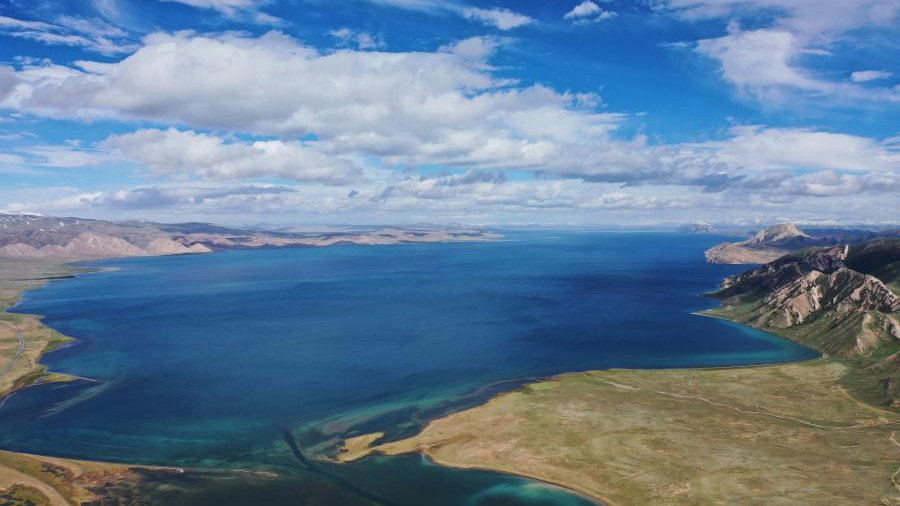Japan's nuclear regulator approves releasing radioactive wastewater into ocean despite opposition
TOKYO, July 23 (Xinhua) -- Japan's nuclear regulator on Friday authorized a controversial plan to discharge radioactive wastewater from a crippled nuclear plant in northeast Japan into the Pacific Ocean, prompting protests from the public.
The Nuclear Regulation Authority (NRA) on Friday held an extraordinary meeting and gave the final approval to the controversial plan submitted by the plant's operator, Tokyo Electric Power Company Holdings Inc. (TEPCO), in line with a government decision.
The government and TEPCO plan to release the radioactive wastewater from the disaster-hit Fukushima Daiichi nuclear power plant next spring, roughly 1 km off the Pacific coast in Fukushima Prefecture.
Under the plan, wastewater containing radioactive tritium and some other isotopes, generated from water used to cool down melted nuclear fuel at the disaster-stricken plant, will be discharged through an underwater tunnel into the Pacific Ocean after being treated.
The plant had its key cooling functions knocked out following a massive earthquake-triggered tsunami just over a decade ago, which resulted in the worst nuclear crisis since Chernobyl in 1986.
The wastewater being stored in tanks at the plant is estimated at about 1.2 million tons and the lengthy discharge process is projected to take decades.
According to the agreement TEPCO has signed with the prefecture and the host towns of Okuma and Futaba, the operator must gain their consent before building or adding facilities that could cause their area to be impacted by radioactive materials.
NRA Chair Toyoshi Fuketa said at an agency meeting on Friday that TEPCO should try to reduce the amount of water contaminated with radioactive materials and streamline work toward the discharge because more time is needed to measure the tritium concentration of treated water before it can be released.
After the NRA approved TEPCO's draft plan in May, many Japanese citizens and civic groups as well as some global environmental bodies urged the NRA to give clear explanation about the safety of the discharge plan and consider alternative options such as "making storage tanks bigger and expanding the land space."
The officials discussed the public opinions and concluded that what TEPCO has done so far with the radioactive wastewater and its plan are "reasonable," Japan's public broadcaster NHK reported.
Japan's fisheries, however, have maintained an ardent opposition to the plan, as it will almost certainly cause further damage to the industry's reputation in the region.
In addition, several countries and regions continue to impose restrictions on Japanese agricultural and fishery products due to the initial Fukushima crisis amid continued concerns over the safety of the produce.
Meanwhile, some of Japan's neighbors have voiced their concerns and objections over the discharge.
China expressed its firm opposition to the regulator's move on Friday. Foreign Ministry Spokesperson Wang Wenbin said at a press conference that it is extremely irresponsible for Japan to ignore the concerns and strong opposition from all parties.
"The disposal of nuclear-contaminated water in Fukushima could affect the global marine environment and the public health of Pacific-rim countries. It is by no means a private matter for Japan. The Chinese side once again urges the Japanese side to earnestly fulfill its due international obligations, dispose of the nuclear-contaminated water in a science-based, open, transparent and safe manner, and stop pushing through the plan to discharge the water into ocean," he said.
"If Japan insists on putting its own interests above the public interest of the international community and insists on taking the dangerous step, it will surely pay the price for its irresponsible behavior and leave a stain in history," he said.
Responding to the regulator's official approval of the plan, the South Korean government convened a special meeting and stated that it would take "best responsive measures internally and externally" under the principle that people's health and security are of utmost importance.
People in Tokyo took to the streets to protest the approval despite scorching heat. Some protestors used megaphones to express their discontent, while others held banners warning about radioactivity at the plant.
The Fukushima power plant was damaged by the 2011 massive earthquake and tsunami, which caused core meltdowns at multiple nuclear reactors.
Water that has become contaminated after being pumped in to keep the melted fuel cool has been accumulating at the complex, also mixing with rainwater and groundwater at the site.
Photos
Related Stories
- Iran says U.S. failed to take initiative in Doha nuclear talks
- Time, venue of new round of nuclear talks being finalized: Iranian negotiator
- IAEA holds first int'l conference on nuclear law
- China calls for restraint regarding nuclear issue on Korean Peninsula
- Chernobyl nuclear plant disconnected from power grid as Russian, Ukrainian FMs to meet in Turkey
- Ukraine says Chernobyl nuclear power plant disconnected from power grid
- China leads in five-state joint statement on preventing nuclear war, arms race
- China's second nuclear unit with Hualong One reactor starts power generation
- Iran says presents draft proposals on sanctions removal, nuke restrictions at Vienna talks
- Vienna talks parties agreed on priority of sanctions issue: Iran's top negotiator
Copyright © 2022 People's Daily Online. All Rights Reserved.









